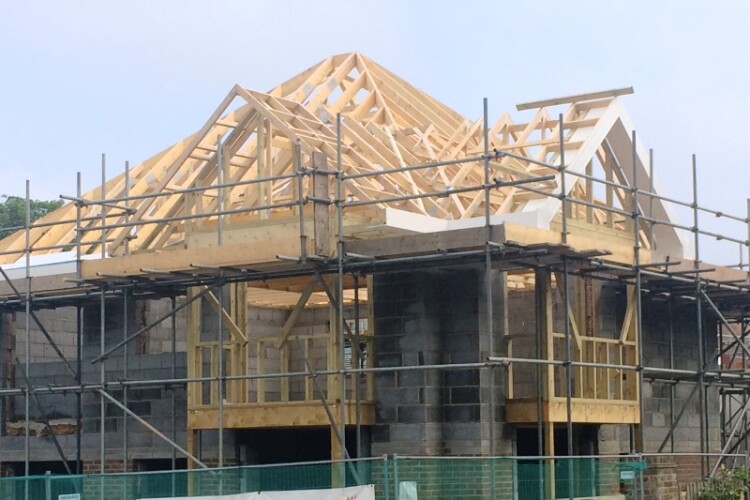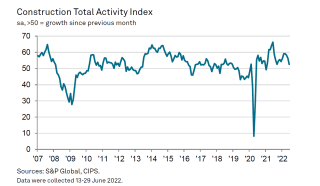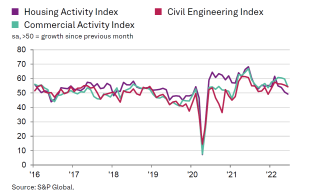The latest monthly survey of construction purchasing managers indicated not just another slowdown in growth but also a sharp decline in business expectations for the year ahead. June data indicated that growth projections are now the least upbeat since July 2020.
At 52.6 in June, down from 56.4 in May, the headline seasonally adjusted S&P Global / CIPS UK Construction Purchasing Managers’ Index (PMI) – which measures month-on-month changes in total industry activity – registered above the 50.0 no-change mark for the 17th consecutive month. However, that 52.6 score makes it the slowest rate of expansion since September 2021.
Civil engineering was the most resilient sub-sector in June, scoring 54.3, down from 55.5 in May. The commercial segment scored 54.3, down from 59.8 in May.
House-building was the weakest-performing area of construction activity for the fourth month running in June. Moreover, the latest index reading of 49.3 signalled an overall downturn in residential work for the first time since May 2020.
June data pointed to a solid rise in total new orders, but the rate of expansion softened to its weakest since October 2021. Some construction companies noted a lack of new work to replace completed projects due to economic uncertainty and inflation concerns.
Efforts to boost capacity in response to greater overall workloads contributed to another robust rise in staffing numbers during June. Job creation has been recorded in each month since February 2021. Survey respondents once again commented on shortages of candidates to fill vacancies, despite higher wage offers.
Looking ahead, around 36% of construction companies anticipate a rise in business activity, compared to 17% that expect a decline. While this remains positive, the degree of optimism expressed is the lowest since July 2020. Declining business confidence has now been recorded for five months running.
Tim Moore, economics director at S&P Global Market Intelligence, which compiles the survey said: "The gloomy UK business outlook and worsening consumer demand due to the cost of living crisis combined to put the brakes on construction growth in June. Commercial construction saw a considerable loss of momentum as clients exercised greater caution on new spending, while long-term infrastructure projects ensured a relatively resilient trend for civil engineering activity.
"House-building has expanded more quickly than the rest of the construction sector over the course of the pandemic, but now finds itself as the worst-performing broad category so far in 2022. Moreover, the latest survey indicated an outright decline in residential work for the first time in just over two years.
"Construction companies appear braced for a difficult second half of the year as new order growth and business activity expectations fell again in June, reflecting inflation concerns, higher interest rates and less favourable domestic economic conditions. Measured overall, the degree of optimism across the construction sector is now the lowest seen since July 2020."
Duncan Brock, group director at the Chartered Institute of Procurement & Supply, said: "Residential building levels fell for the first time since May 2020, and builders are getting an increasingly stark vision of the marketplace they are now operating in as overall activity growth also fell sharply.
"This is in glaring contrast to the pandemic years where the construction sector held up well compared to the other sectors, but the weakest rise in output since September 2021 and the softest increase in new orders since October shows this has now changed. The heightened competition faced for short supply raw materials as well as essential skills for the building trade is squeezing the optimism out of builders with the lowest business expectations since July 2020.
"Returning from pandemic lockdowns has not been easy as builders now face greater affordability challenges not just for staff wages but for the energy-intensive materials needed to deliver the pipelines of construction work they currently have. With a downbeat economic environment, the sector will be fearful about what is round the corner during the rest of this year."

Joe Sullivan, partner at accountancy group MHA, said that the survey appeared to confirm that the full inflationary effects of the war have now worked their way through the system, threatening more companies with insolvency.
“In recent months we had seen material prices start to level off,” he said, “but we’re now seeing the full effects of the war in Ukraine work their way through the system, driving up prices and ensuring we continue at these price levels for some time. Although the war began on 24th February, it takes time for the range of effects to work their way through. Together with these input cost increases, further shortages of raw materials like timber and manufactured goods such as generator components are behind the growing number of insolvencies in the construction sector.
“The remarkable success of the residential property market continues but the rate of price increases is now slowing. However, the restriction in the supply of new plots is the key factor which will guard against the house ‘price bubble’ bursting significantly. This makes the sub-sector a better investment bet than most others for the year to come. Vendors are trying to pre-empt a recession by becoming more reasonable in the prices they seek, trying to tie up a deal quickly rather than holding out for higher prices.
“Further wage increases are inevitable. Contractors are under pressure not only to maintain their current head count for existing work but to retain the individuals with the appropriate skills necessary for opportunities available for tender.
“Contractors are making progress with energy efficient delivery but the cost of investment and management time in achieving sustainable goals is starting to filter through the supply chain. This may preclude some subcontractors from involvement in future work, so firms need to pay great attention to this area, to stay relevant and to future proof their business.”
Mark Robinson, chief executive at public sector procurement agency Scape, said: “A third consecutive month of output decline is confirmation of the impact that rising material costs and economic pressures are having on the industry’s health. This is a concern not just for the sector, but for the performance of the wider UK economy as it continues to navigate through these uncertain times.
“As we hit the peak summer season, contractors remain well aware of the bigger picture at play. Record-high inflation levels remain a threat to future developments at a time when new regenerative infrastructure that empowers local communities is needed to help drive the Levelling Up agenda forward. Early client engagement and collaborative project management will be vital for the sector’s health in the coming months, ensuring that projects remain on track during the challenging times ahead.”
Gareth Belsham, director of surveyors Naismiths, said: “Each passing month sees the flow of new orders slow further and more warning lights come on. Housebuilders, once the poster children of Britain’s post-pandemic construction boom, have been at the back of the class for four months in a row. Residential construction is now contracting for the first time since the darkest days of the first lockdown in 2020.
“Housebuilding is more directly exposed to consumer confidence than any other construction sector; and it’s clear that some residential developers are easing off the gas pedal in response to the slowing economy and rising cost of mortgages.
“While output is still climbing in infrastructure and commercial property building, the pace is slowing steadily – and overall expansion is now weaker than it has been at any time since last September.
“With some firms struggling to find new orders to replace completed work, business confidence is starting to flail – and it has now fallen for five months in a row. Barely a third of construction firms expect business activity to rise in coming months, with sentiment a shadow of what it was during last year’s surge in work.
“The first half of 2022 has been challenging to say the least, and with the twin risks of inflation and insolvency looming ever larger, the second half could be even tougher.”
Got a story? Email news@theconstructionindex.co.uk





